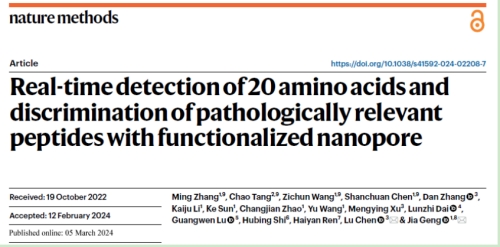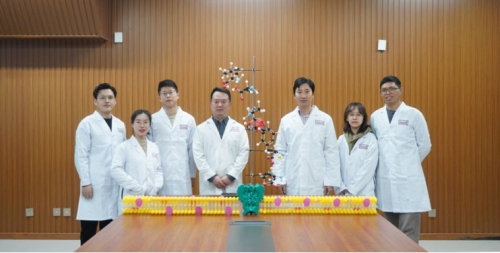
Prof. Jia Geng’s team of the State Key Laboratory of Biotherapy at West China Hospital and Prof. Lu Chen’s team from the West China Second University Hospital collaborated to publish a research paper titled "Real-time Detection of 20 Amino Acids and Discrimination of Pathologically Relevant Peptides with Functionalized Nanopore" in Nature Methods on March 5. The research paper elucidates a new strategy for the Nanopore Exopeptidase Real-time Peptide Sequencing (NEPS), providing a feasible approach for single-molecule protein sequencing and demonstrating the excellent potential of combining biosensor technology with artificial intelligence algorithms.

Jia Geng, Lu Chen (left four, left five) and main authors (left to right: Shanchuan Chen, Dan Zhang, Ming Zhang, Zichun Wang, Chao Tang)
“Precise identification and quantification of amino acids is crucial for many biological applications. Here we report a copper(II)-functionalized Mycobacterium smegmatis porin A (MspA) nanopore with the N91H substitution, which enables direct identification of all 20 proteinogenic amino acids when combined with a machine-learning algorithm. The validation accuracy reaches 99.1%, with 30.9% signal recovery. The feasibility of ultrasensitive quantification of amino acids was also demonstrated at the nanomolar range. Furthermore, the capability of this system for real-time analyses of two representative post-translational modifications (PTMs), one unnatural amino acid and ten synthetic peptides using exopeptidases, including clinically relevant peptides associated with Alzheimer’s disease and cancer neoantigens, was demonstrated. Notably, our strategy successfully distinguishes peptides with only one amino acid difference from the hydrolysate and provides the possibility to infer the peptide sequence. (Abstract)

Real-time identification of amino acids during peptide hydrolysis.

Ming Zhang reports the progress of single-molecule protein sequencing at the International Conference.
The NEPS technology provides powerful tools for deciphering the "Book of Life", offering more accurate disease diagnosis and treatment, and faster drug development. At the same time, it represents China's original innovative capabilities in bio-sensing technology and proteomics tools, putting China in the forefront of the world.Jia Geng and Lu Chen are the co corresponding authors of this article; Ming Zhang, a graduate student from Sichuan University, Chao Tang, a postdoctoral fellow, Zichun Wang, and Shanchuan Chen (graduate students) are the co first authors of this paper. The research was funded by the National Key R&D Program "Intelligent Sensors", the Sichuan Provincial Department of Science and Technology, and the 135 Program of West China Hospital of Sichuan University.
https://www.nature.com/articles/s41592-024-02208-7
